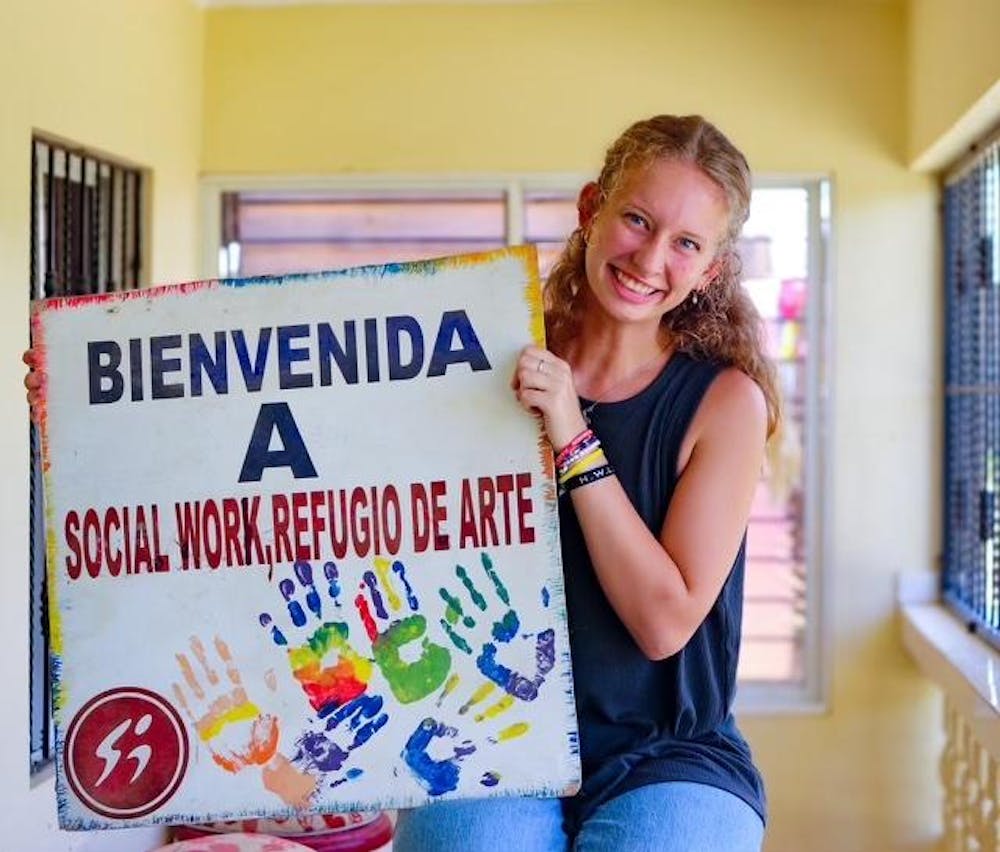Something changed in Abby Portolese the third time she visited the Dominican Republic.
“The first two trips were really like an invitation from the Lord, just to come and see, to come and experience,” Portolese said. “Just come look and start to experience and start to dream and start to discern what this life could look like.”
Her third trip, however, enkindled a fire within. She decided to step out in faith.
“I feel like this is definitely written in my story and written in my will, this work,” she said.
This past summer, from May to August, Portolese spent 12 weeks in Santiago, Dominican Republic, serving with Students International, a global missions organization.
During those 12 weeks, she worked in a girls’ and women’s social work site focusing on community-oriented care in Santiago’s poorest neighborhood, Cienfuegos, and ministering to short-term teams that came to volunteer with the organization.
Daily activities included oversight on different community sites, such as healthcare, education, building, sports and social work. She would also lead Bible studies, especially for the girls, play games and facilitate crafts and activities.
“It was just a space for girls to come and just be seen and be known and be loved and be heard,” she said.
As junior social work major, Portolese has a heart for the marginalized. This was reflected in her devotion to making the Lord known despite linguistic challenges, as she did nearly all her work in Spanish.
Cultural differences fundamentally challenged and grew her outlook on faith.
“I remember my very first trip to the (Dominican Republic), one of the staff members said in a devotional that ‘Dominicans are going to look at you and see what you have in your hand and covet that, but you’re going to look and see what they have in their heart and you’re going to covet that,’ and that stuck with me. I lived that this summer,” Portolese said.
Portolese began to reflect on the American value given to material possession.
A call to steward material possessions well as Christians became a major conviction for her.
“OK, how do I use the stuff that I own and the things in my hand?” Portolese said. “How do I, Lord? Are you alive in this relationship? What is sitting between me and this thing? Is it my flesh?”
She found that relinquishing such value on the material opened space for the Holy Spirit, something that was evident in Dominican culture. A Holy reorientation had taken place within her heart.
The church Portolese attended over the summer was vastly different from modern western churches.
There was no focus on what the screen looked like or on greeters that they had. The house that shared a wall with it was cooking and blaring music half the time, and there was air conditioning available. Sometimes, technological difficulties cropped up and the microphones would break, she said.
“None of it mattered, because those things were not sitting between us and the Lord in that space,” she said. “Our experience of the Lord, our ministry to the Lord, was not dependent on things. I just remember how it was just so normal to stop and pray (for someone), whether you knew their name or not.”
Portolese’s role quickly showed her how spiritual and physical needs intersect. The needs of one were quickly accompanied by the needs of the other.
“There was this incredible urgency from every single person, this intense curiosity and hunger and desire to just meet the Spirit of God and host him,” she said.
The population she interacted with was impoverished, but she observed that the most striking kind of poverty was spiritual and relational poverty.
Portolese was honest about the impact of encountering poverty firsthand. A large part of her role involved working with women who faced greater disadvantages because of poverty.
Often, in developing nations such as the Dominican Republic which are socially more traditional and patriarchal, women are greatly impacted by poverty.
“Women are expected to stay home and start a family and do the housework and be a homemaker,” she said.
Portolese said this is often at the expense of education, as many women do not get the chance to finish high school.
But each day, Portolese remained confident that God would meet her. Her work there testified to God’s provisional abundance.
“It’s just an honor to really just be part of it, to be entrusted with that ministry, to be entrusted with serving, with serving those people, and being served by those people,” she said. “In the summer I learned a lot about how ministry is literally just showing up with an open heart, and showing up with a gentle heart, a heart clothed by the fruit of the Spirit … the grace of God is that we are known fully and that we are loved fully.”



